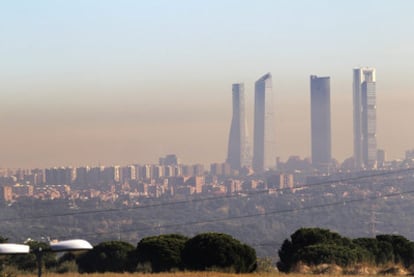Environment Ministry calls for "shock measures" to combat pollution
Traffic levels are "responsibility of city halls," says climate change secretary
The Environment Ministry considers that the councils of big cities - in particular Madrid and Barcelona - are not doing enough to combat pollution caused by traffic. Spain's two largest cities announced last week that they are to request a moratorium on complying with European Union-set pollution levels, but the government has said that these requests will not be dealt with unless clear progress is made.
According to the ministry, such petitions are practically doomed to failure in Brussels if anti-traffic measures are not put in place. The secretary of state for climate change, Teresa Ribera, has called for "shock measures such as restricting circulation or tolls," and added that traffic, the principle cause of pollution, "is the responsibility of city halls."
Atmospheric pollution is a serious public health problem. Year after year, the big cities in Spain exceed admissible levels. Last year was the first in which the European Commission set thresholds for nitrogen dioxide, and expectations are already falling. Madrid and Barcelona have announced that they will request a moratorium, although Valencia and Bilbao have managed to comply with the EU limits.
Not even a year as humid as 2010 has seen NO2 levels fall within the limit of 40 micrograms per cubic meter. Madrid recorded 44 micrograms and Barcelona 50. Until now the limits were for suspended particulates only, which allowed certain city halls to blame their pollution on Saharan dust, which sometimes reaches the peninsula.
The mayor of Madrid, Alberto-Ruiz Gallardón, of the conservative Popular Party, announced a plan in 2006 to restrict access to the city center for the most polluting vehicles. The measure, he said, would come into force two years later. "We have to take action now to comply with the European air-quality rules in 2010," he said at the time. Five years later there is no trace of the plan, and Gallardón's team has moved the air-quality measuring stations to areas with less traffic. According to state attorney for the environment, Antonio Vercher, this produces results that do not reflect reality.
Ecologists, trades unions and researchers are calling for reductions such as those in effect in other European capitals. Barcelona, Seville and Vitoria have bike-rental plans, while the Catalan government has placed speed limits in Barcelona in an effort to fight pollution.
The Environment Ministry has reason to doubt the success of moratorium requests. The EU has denied practically all such extensions sought by Spain for suspended particle levels. Compliance with pollution limits has been obligatory since 2005. Given Spain's non-compliance, the government requested extensions for 13 areas in 8 regions, in 2008 and 2009. The Commission's response was unequivocal: it denied all requests, except for one. Only Puertollano, in Ciudad Real was granted an extension - until June 2011 - to comply with the daily limits.
The list of faults that Brussels found in Spain's petitions is long. Countries must show that they have done everything possible to reduce pollution and that, if the moratorium were to be approved, they will put into place efficient measures to do so. Spain failed on both levels. Catalonia, for example, requested a moratorium for Barcelona and for the area of Vallès-Baix Llobregat. However, it was not able to demonstrate its anti-pollution efforts.
Several areas claimed that adverse meteorological conditions had prevented them from reducing particle levels, but later they could not produce proof. Barcelona maintained that due to low wind speeds, air pollution was not dispersed, but Brussels found "no correlation" between one thing and the other. Spain was not the only country to request moratoria; Cyprus, Italy and Portugal did as well. Brussels has decided to bring the petitions before the EU Court of Justice. A spokesman from the Commission stated that it could take up to two years to hand down a ruling.

Tu suscripción se está usando en otro dispositivo
¿Quieres añadir otro usuario a tu suscripción?
Si continúas leyendo en este dispositivo, no se podrá leer en el otro.
FlechaTu suscripción se está usando en otro dispositivo y solo puedes acceder a EL PAÍS desde un dispositivo a la vez.
Si quieres compartir tu cuenta, cambia tu suscripción a la modalidad Premium, así podrás añadir otro usuario. Cada uno accederá con su propia cuenta de email, lo que os permitirá personalizar vuestra experiencia en EL PAÍS.
¿Tienes una suscripción de empresa? Accede aquí para contratar más cuentas.
En el caso de no saber quién está usando tu cuenta, te recomendamos cambiar tu contraseña aquí.
Si decides continuar compartiendo tu cuenta, este mensaje se mostrará en tu dispositivo y en el de la otra persona que está usando tu cuenta de forma indefinida, afectando a tu experiencia de lectura. Puedes consultar aquí los términos y condiciones de la suscripción digital.








































